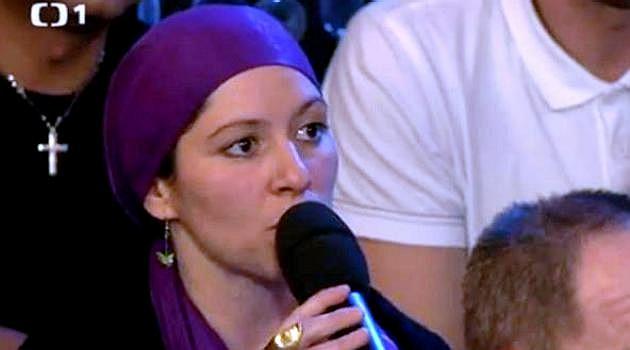Commentary: Czech TV talk show contributes to anti-Romani sentiment

Last Thursday evening the public channel Czech Television 1 broadcast an episode of Michaela Jílková’s "Máte slovo" ("You Have the Floor") program on the topic of "Tightening up Welfare". Romani activist Ivana Mariposa Čonková was in the studio audience and protested against the management of the program, whom she believes have grossly violated the public broadcasting statutes of Czech Television and intensified anti-Romani sentiment in the country.
The activist has decided to file a complaint against the Board of Czech Television. News server Romea.cz publishes her statement on the program in full translation below:
Czech Television turning poverty into a reality show
The program "Máte slovo" on Czech Television has once again failed to meet the criteria for a public broadcasting service. On 9 January 2014, Czech TV broadcast the discussion program "Máte slovo" on the topic of "Tightening up Welfare" and the reintroduction of so-called community service work, an episode that was supposed to discuss a proposal from several senators to amend various laws on this issue.
The proposed amendments would primarily affect people living in poverty. The design of the program, the selection of its panelists, and the entire way in which the discussion was led have once again confirmed the incompetence and lack of professionalism of the production team and of the show’s moderator, Michaela Jílková.
The moderator led the program in a way that divided up society into two groups, "decent citizens" and "inadaptables". By so doing, she not only simplified this entire issue in a completely inappropriate way, intentionally polarizing the discussion, but she also violated the statutes of Czech Television, which require, among other things, the creation and dissemination of programs aiming to enhance mutual tolerance and understanding and to support the cohesiveness of a pluralistic society (see Article II paragraph 1 of the statutes).
Most of this particular episode was led by the moderator in this unacceptable spirit. The program also failed to meet another obligation of a public broadcaster, namely, to provide balanced, impartial, objective, and verified information so that members of the public can freely form their own opinions (Article II paragraph 1).
This requirement was not met because the dramaturgy of the program did not ensure the presence of persons qualified to argue against the senators’ dubious proposals. If this was due to the unexpected absence of the director of the Czech Government Agency for Social Inclusion, Martin Šimáček, I do not understand why my offer to replace him on the panel (instead of just participating from the audience) was not taken advantage of (I was called upon to participate by many Romani activists and several nonprofit organizations).
There are many other qualified public figures besides myself who could have been invited to play this role, but none were. Another unavoidably inappropriate aspect was the way in which the moderator always leads this program.
The moderator de facto never gives the floor to anyone other than herself. Instead of a real debate, we get an aggressive "one-woman show" that takes of advantage of topics that are essential to society and abuses them.
Instead of this broadcast contributing toward improving the legal awareness of the inhabitants of the Czech Republic (as per Article II paragraph 1), it remained superficial, at the level of confirming stereotypes – for example, the representative of unemployed people was a Romani man, while the representatives of employed people were members of the majority ethnicity. Even though, according to current news reporting by Czech Television itself, every fifth Czech is at risk of poverty, the program created the impression that this is mainly a problem for Romani people.
As a result of discrimination against Romani people on the labor market, a greater proportion of them are afflicted by unemployment and are also more visible, because in the Czech Republic they comprise a rather easily identifiable minority. The atmosphere in this society is strongly anti-Romani, as proven by speeches made by our senators, including when proposing the bills discussed on this program.
The program created space for the repetition of those anti-Romani arguments – uncorrected for the most part – and therefore contributed to further creating anti-Romani sentiment in this society. Given that this has happened repeatedly, I would remind you of the complaint filed against this same program on 4 October 2013; it is time to file yet another complaint in that same spirit with the Board of Czech Television.